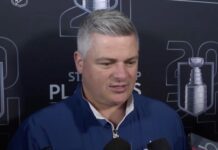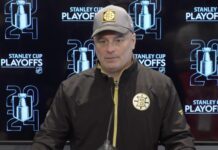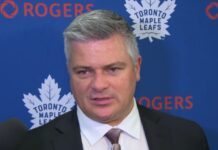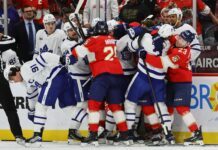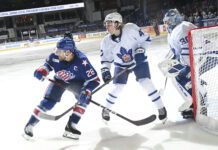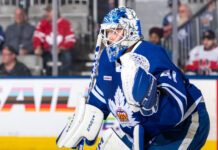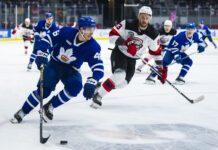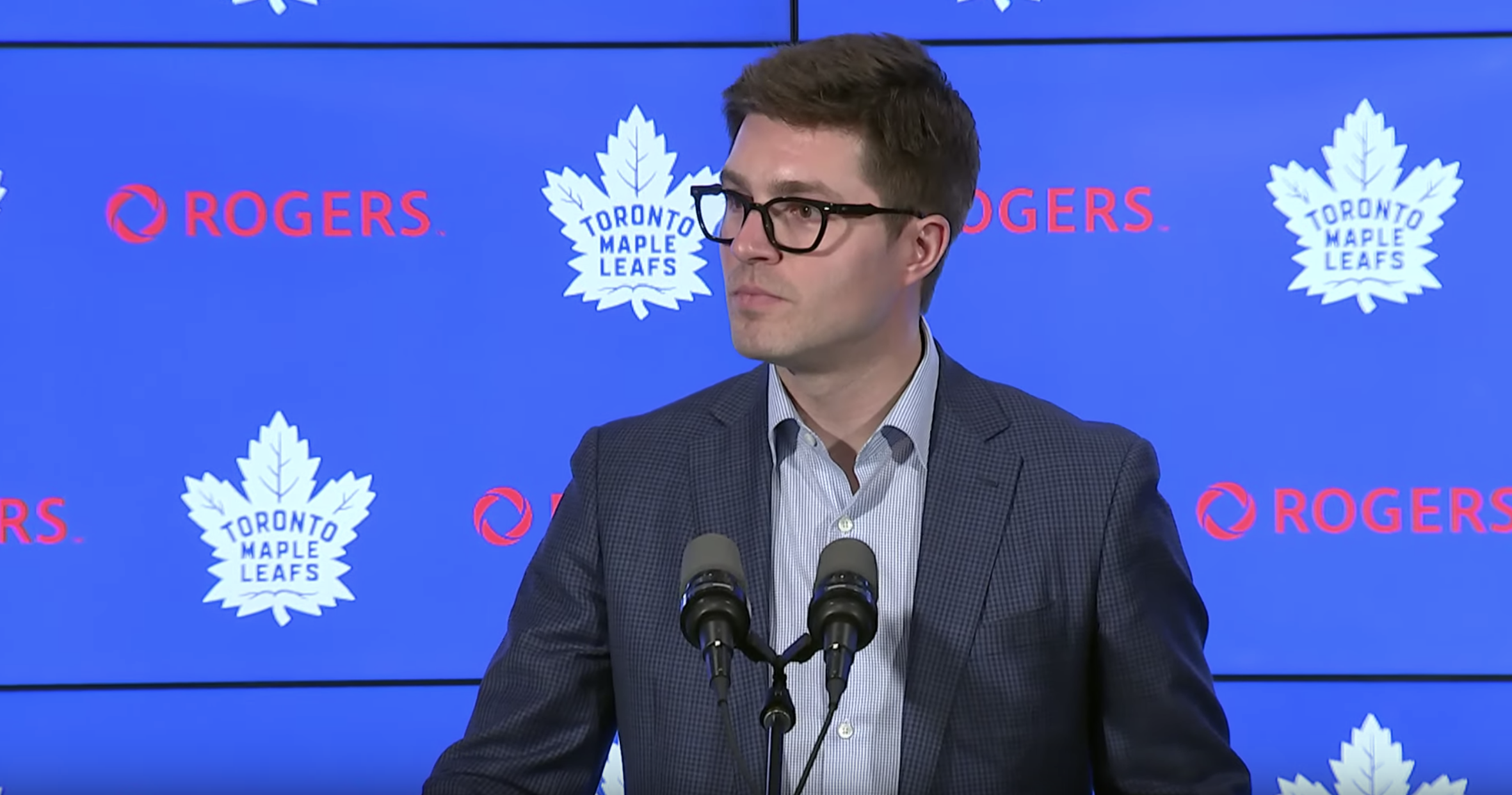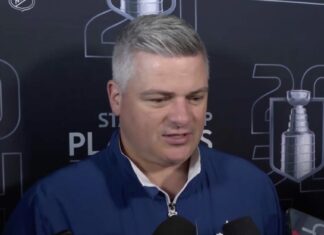Kyle Dubas addressed the media after a closed-door team meeting was held in lieu of practice on Thursday.
How do you feel the team has dealt with the early adversity?
Dubas: I think we’ve talked about it as a group right from the start of training camp. You always want to know how your group and how your organization is going to react when things don’t go perfectly, especially with the fact that it is a young team and we still have to learn how to go through this. I think there are teams that handle it very well and they are usually teams that have got a lot of collective experience together.
Any time you go through a stretch where you maybe miss your expectations by a little bit, or maybe pucks aren’t going in, or you aren’t winning as many games as you think you should, it gives you a great opportunity as a group to examine where you are at and how you can be better.
That’s all I really look for. I don’t get too up and down by any stretch — not too high when we won three games last week or not too low right now. We show great stretches throughout where we play great hockey. It’s just becoming a team that does that more and more often.
What have you learned about the group in the first 20 games?
Dubas: How much time do you have? Lots. We’ve had some great moments. We’ve had some guys step up that maybe you didn’t expect to as quickly as possible. You look at a Mikheyev or a Kerfoot coming in, or Justin Holl.
We’ve had some stretches where we haven’t done what we wanted to do. We’ve had stretches where we’ve dominated games — even stretches last night in New York, where we showed ourselves and everybody else what we’re fully capable of. It is just trying to continue to carve out a way that we can do that more often. I don’t think we are too far off of doing that by any stretch.
Where would you most like to see improvement?
Dubas: I think if you look at the game last night, there were long stretches of the game at the start and in the second period as well where we were excellent. They didn’t seem to be able to get out of their end because we were coming at them wave after wave every shift. Every time they would take possession of the puck back, we’d be tracking back and our D would be spaced well. We really prevented them from getting up the ice.
I think when something doesn’t go our way and the puck bounces and it goes in our net, it’s just not getting back on our heels and continuing to stay on our toes and staying on attack mode to deal with that stuff. That, to me, is what I look for. I think a lot of the other stuff — with special teams and otherwise — is largely percentage driven and as long as we are continuing to work at it as a collective, that’ll improve.
The thing I’d like to see is just when we are at our best, being able to continue to sustain that when things don’t necessarily go our way. I think that’s what we will look for here in the next stretch.
In a perfect world, the usage of the backup goalie — you want Frederik Andersen to have a little bit more rest than he has. What comes first? The play of that backup goalie, the person you have there, the rest that Freddy should be getting — where do you settle on that issue?
Dubas: Especially early in the season, you want to try to get Freddy in a groove and get him feeling comfortable. When you sit at the beginning of the year, I know Steve Briere and Mike sit down and we all set up a way that we want to handle it at the beginning. We always re-evaluate where we are at and what we are looking to do from that point on.
With Hutch, I don’t think we played particularly well in front of him for stretches and made it difficult on him. It sucks for him because we feel we have to make a move and give Kasimir a chance because of the way he played with the Marlies. He really earned that more than anything else, right? We’ll see how it goes here now. We don’t want to run Fred into the ground. At the same time, if he’s in a groove, we want him to establish that and do right by him in the long run but also let him get to the point where he feels he is at his best, which he is certainly getting to now.
Are you keeping your eye on veteran goaltenders?
Dubas: Not right now. I know that is a big topic, but with Kaskisuo, he has been a player that it wasn’t necessarily made easy for at the beginning with the Marlies — being assigned to Chicago, we had Sparks and Pickard here. Since then, after he came back from injury last year, he had an excellent second half for the Marlies and helped them out big time. He was excellent in the playoffs and has had an excellent start to the season. He just turned 26 years old, so he’s earned the opportunity and we will let him run with it here and evaluate from that point.
How do you feel Cody Ceci and Tyson Barrie have fit into the top four this year?
Dubas: Cody is an interesting one. Frankly speaking, I think it goes back to the war between data and subjective scouting. He seems to be a really polarizing player. I think it has been interesting — even when everything underlying about him has been relatively solid, especially when you consider his usage, it seems that every tiny thing he does becomes the referendum on whether he is good or not. That is mindboggling to me because if that would have been done by subjective oriented people in the past, the objective people would have jumped all over it. Now the inverse seems to be happening and it seems to be Cody that is the player it is happening about.
Every defenseman that plays that much and plays in that role is going to have mistakes. You play against the best players in the league — they’re good players — and every defenseman, no matter how good you are, from time to time, you are not going to look your best. I think he has been a good addition for us and he has played above expectations from when we acquired him. We are very happy with him.
Tyson — it is 20 games in and we’ve got a lot of belief in him. He’s shown signs of what his form can be. We knew when we were acquiring him we just wanted him to continue to work and be comfortable here and find that. In the last number of games, he has shown more and more of that. I am excited about the rest of the season from him because we obviously know the player he is. With all of these guys we’ve talked about in previous years, there is an adjustment period. They all have to go through it. For some it is easier than others. Especially with someone who has been someplace and has had success for so long, I don’t really read into the early part of it. I look for the positives and there are a lot of them there lately. I think good things are about to happen.
How much stock do you put into where the team sits at American Thanksgiving? You’ve seen the stat that most of the teams in the playoffs by then remain in the playoffs.
Dubas: It’s an interesting time in hockey because you’ve got that on one hand. On the other hand, you have St. Louis last season, so there is some recency bias with them. I more look at it not in terms of where we stand — it’s always easy to look at it every day and say, “where are we today?” — but more the underlying things. How are we playing? When we are at our best in a game or in a stretch, is this the type of team we feel can reach its potential and can play the way we want? I do feel that way.
I don’t know. Maybe ask me at American Thanksgiving or the next time we get together. I am not going to look at American Thanksgiving and think it is more important than the actual way the club is playing. That is always the most important thing to me.
Why did you always think that Justin Holl could get to the level he is at now? Mike Babcock was just praising him as a big part of what you guys have done so far.
Dubas: Justin Holl — for one, I think his character and the way he handles things is such a huge testament to why you have a belief in him and why you think so fondly of him. There are not many players who could do what he did last year and endure it and keep their optimism and come in every day and continue to work; to look at it and say, “Okay, I know I am sitting 70+ games. I am going to come in and take advantage of it and do the things that they’re asking me to do, and I am going to do it and stay optimistic and positive and be a great teammate to everybody.” Maybe he didn’t necessarily feel that way when he went home, but when he was here, you saw a player that came every day and despite the circumstances not being optimal, he continued to work and stayed positive and believed in himself.
It happened when he first came to the Marlies as well. He didn’t play as much as he would’ve liked. He has just become such an easy person to cheer for. My belief was that if he could get a solid run of play, he would show everybody what he is capable of. It is one of those situations where you are so happy for somebody because they were able to come out and play the way they’ve shown they can play in the past. He stuck with it when maybe others wouldn’t have and has been a very good player for us this year. It is all a credit to him and the development staff and the coaching staff for continuing to stick with it. It’s been fun to watch.
Overall, is it on Mke Babcock to get this team in the right spot, or the players?
Dubas: Whenever a team is at its best and whenever a team is trying to find its way — whenever a team is having a tough stretch — it’s on the collective. It is not up to any one person or player or any one coach or member of the front office. It is up to the collective group to forge its way through. I think that is what makes the most successful organizations — having that. I don’t look at it as being any one person but us collectively pulling in the right direction. I think last night in the game we showed what we are capable of when we are at our best. I think it is up to all of us to continue to work and push for us to get there, and show what we are all about on a nightly basis.
When you put this team together, can you point to a game this year where it’s come close to realizing the vision you’ve imagined?
Dubas: St. Louis I think would be the one. It is obviously a championship team that was at full strength at that time. They had all of their players, I believe, in the lineup and were healthy. I know we didn’t win the game, but I think in terms of the way we played and stuck with the way we want to play and the system, that was probably the best one where I felt you get affirmation: “This is the way we’re built. We know that there are going to be times where it doesn’t look great because we are still evolving and growing. But we can play against a team that is built that way and play that way for 60 minutes and have a night like that.” That would be the one game where it all came together. There have been a few other games where we have played relatively well or very good, but that would be the one I would point to.
How would you describe the identity of the team?
Dubas: I would say it is still in formation. It is not a finished product by any stretch. We are still trying to get there. What we are aiming towards is a team built on speed, talent, and creativity but also tenaciousness when we don’t have the puck, like we saw for stretches last night. They would get the puck back and we were right on them right away, not allowing them to get into our zone.
When you point to what we want the team to be about, you are saying, “What are teams saying when they are walking into your building?” We want to shift it away from the questions to the established Stanley Cup-winning players with the, “What do the Leafs need to do?” to, “Here is what we are and here is what to expect.” I think it is on us to get there.


